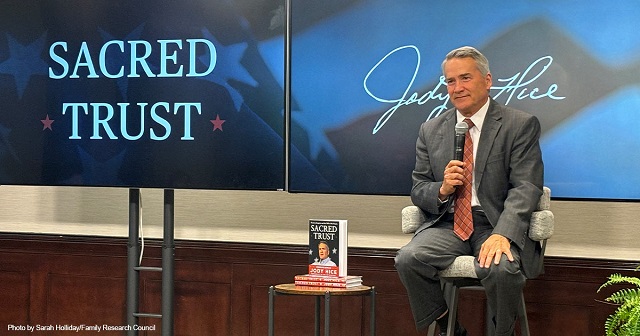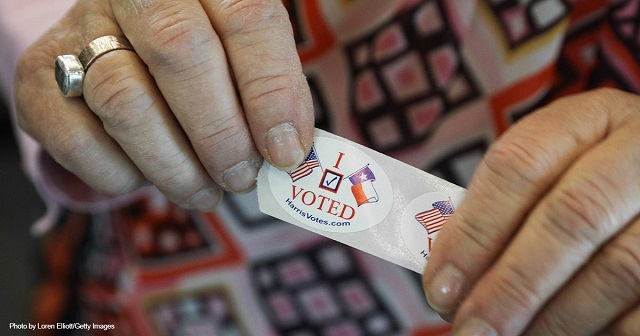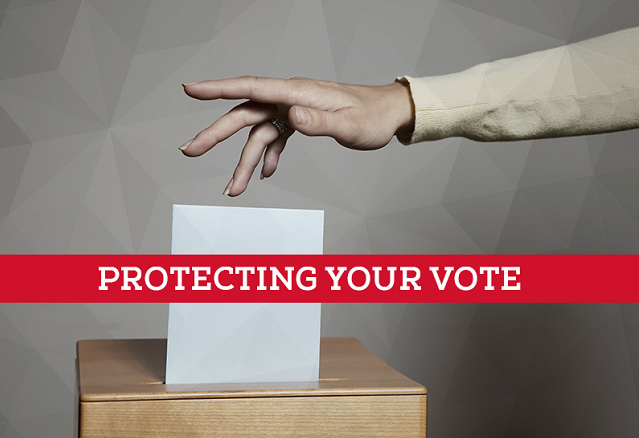Hice: Election Integrity Is a ‘Sacred Trust That Must Be Protected’

“There is perhaps no greater endeavor that is more fundamental for the perseveration of our Republic than preserving the integrity of our elections,” writes Jody Hice, senior vice president at Family Research Council. “If the voice of the people is heard, and their resolve enacted, both in policy and representation, there is hope for a government ‘of the people, by the people, and for the people.’” This is a part of the former congressman’s new book, “Sacred Trust,” where he tackles an issue that has become increasingly important to American voters: Election integrity.
In his book, Hice outlines the fundamental necessity of having election integrity. As a former member of Congress, he has seen this issue from the inside out, and watched as it rose to the prominence it has today. In comments to The Washington Stand, he shared that election integrity “was not a topic that was on my radar when I went to Congress.” But Hice explained that during the COVID pandemic, the Democrats started pushing for “a federal takeover of elections.”
As a Georgia native, Hice became engaged in the fight once these arguments from the Left began to target his own state. He recalled how Democrats accused Georgia’s 2021 election integrity bill of suppressing minority voters and other claims that made it seem Georgia lacked integrity in the election process. “Well, I grew up in Georgia and I knew these things were not real. So, I started pushing back,” he remarked.
Hice’s journey led him to become a spokesperson within the realm of election integrity as Democrats fought to change voter laws “from ballot harvesting to taking away voter ID, one thing after another,” he detailed. “All of which, in my mind, disintegrated election integrity.” But what stood out to him over the years of engaging in this fight, especially after the process of writing his book, is how the “topic is taboo” — specifically for Republicans. “When a Republican raises a red flag that elections have been or could be compromised, we are called ‘election deniers.’ We are called ‘threats to democracy’ just for raising the issue, let alone addressing it publicly,” he emphasized. However, he added, “Democrats have challenged elections forever, and there’s no problem.”
In many ways, it was an emotional “hurdle” Hice said he had to jump “to deal with the reality of the political environment on a topic such as this.” But despite the task of navigating through the hypocrisy, “these are issues that have to be addressed,” he stressed.
In the book, Hice recounts how he is thankful he had the opportunity to share his experiences while in Congress, as well as other aspects of his life such as his time as a pastor, and how it all related to the topic of election integrity. He explained to TWS that the book’s title, “Sacred Trust,” is “indeed” what election integrity is. “The right for the people to vote, to be a self-determining populace in regard to who’s going to represent them, and what kind of policies we’re going to tolerate, be it on the state, local, or federal level, is a sacred trust that must be protected,” he said.
Although, what Hice wanted to make clear is that addressing the problem is only half the battle. “The topic itself is not just exposing problems but trying to offer some solutions.” On a recent episode of FRC’s Outstanding podcast, he went even further: “We need a divine work of God in this country. We need the good hand of God to be poured out upon this land. We need a spiritual awakening, and without the aid and the help, the intervention of Almighty God, we cannot, I don’t believe, fix this by political means alone.”
Hice elaborated on this theme at an FRC event Wednesday night featuring his book. “Church leaders across the board have to engage what’s happening in our country,” he underscored. For Hice, the reason America is “in the mess we are in right now is because the church and the faith leaders … [from] different denominations [have] just been silent [and] sitting on the sidelines.” He elaborated that too many in the church have believed “the lie [of] separation of church and state,” or they’ve become too concerned over losing members or overstepping boundaries.
However, the “truth of the matter is,” he continued, “our system of governance does not work without involvement of the people. And furthermore, when you’re talking limited government, which is what our Constitution is all about, it is impossible to have limited government if you don’t have people capable of self-governing their own lives.” And, as Hice emphasized, self-governance “comes by religion and morality,” which the Founding Fathers said were “‘indispensable supports,’ because without those two things, all the rest of it collapses.”
Ultimately, Hice stated, “the role of pastors [and] faith community [is] to bring … an understanding of God, accountability to God, and that all of us will stand before Him” one day. He added, “There is such a thing as right and wrong, [and] all these things are the very legs upon which limited government rests. And … what we are seeing is the more God is removed from our culture, the more problems we have, and the bigger government gets. Christian leaders have to engage.”
Hice concluded by pointing out that believers have a great responsibility to be good stewards of their role in the political arena, since election integrity is “among the highest issues” for American voters. “If we lose that in a constitutional republic … then we lose everything,” he remarked, noting that elections are ultimately about what the people want. “At the end of the day, it’s not about who won an election. It’s about whether or not the voice of the people was heard and accurately portrayed.”
AUTHOR
Sarah Holliday
Sarah Holliday is a reporter at The Washington Stand.
RELATED ARTICLE: Ex Obama Strategist Predicts Arizona Supreme Court Ruling Could ‘Tip This Election’
POSTS ON X:
SPEAKER JOHNSON: “The states are prohibited from asking someone if they’re a citizen. The House Republicans are introducing a bill that will require proof of citizenship to vote.” pic.twitter.com/tnhgoYoDks
— Benny Johnson (@bennyjohnson) April 12, 2024
A simple message to the GOP: play to win.
1. Make Election Day a National Holiday
2. Single-Day Voting
3. Paper Ballots
4. Government-issued voter ID to match the voter file
5. English as the sole language that appears on a ballot pic.twitter.com/Kaf5J9yhg0— Vivek Ramaswamy (@VivekGRamaswamy) April 12, 2024
EDITORS NOTE: This Washington Stand column is republished with permission. All rights reserved. ©2024 Family Research Council.
Enjoying news and commentary from a biblical worldview? Stand with us by partnering with FRC.
The Washington Stand is Family Research Council’s outlet for news and commentary from a biblical worldview. The Washington Stand is based in Washington, D.C. and is published by FRC, whose mission is to advance faith, family, and freedom in public policy and the culture from a biblical worldview. We invite you to stand with us by partnering with FRC.


